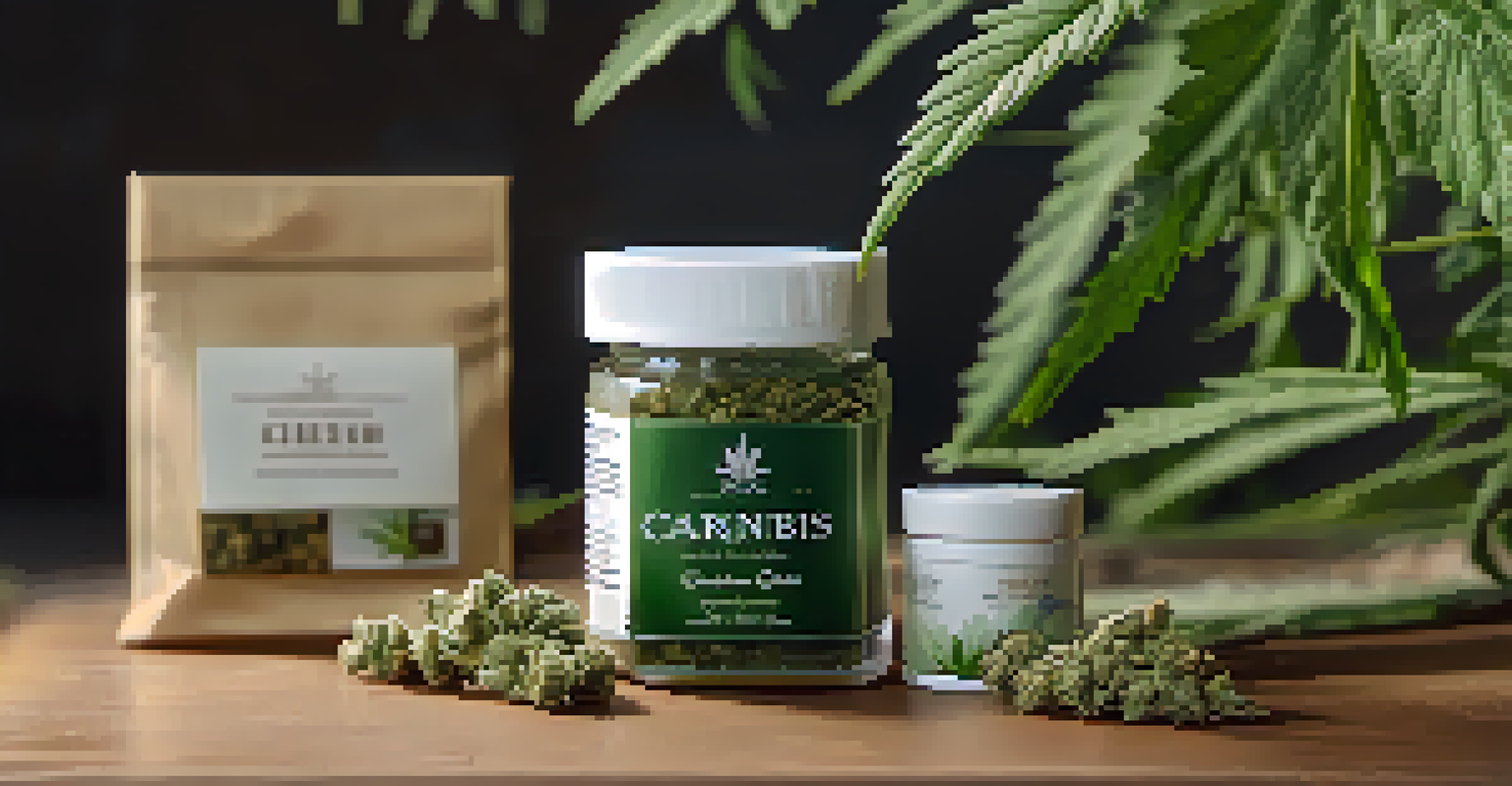Influencer Marketing: Promoting Cannabis Brands on Social Media

Understanding Influencer Marketing in the Cannabis Industry
Influencer marketing has become a powerful tool for brands, including those in the cannabis sector. By partnering with individuals who have a significant following on social media, cannabis brands can reach targeted audiences more effectively. This approach allows brands to leverage the trust and credibility that influencers have built with their followers, making it easier to promote products and services.
Influencer marketing is not just about getting your product in front of an audience; it's about building a relationship with that audience through authentic connections.
In the cannabis industry, where advertising on traditional platforms can be restricted, influencer marketing offers a viable alternative. It creates a space for authentic conversations about cannabis products, education, and responsible use. Brands can benefit from influencers who share similar values and resonate with their target market, resulting in more impactful campaigns.
Moreover, as cannabis continues to gain acceptance, the influencer landscape is evolving. Many influencers are passionate about cannabis culture, wellness, and lifestyle, making them ideal ambassadors. This dynamic allows cannabis brands to tap into niche audiences that are genuinely interested in their offerings.
Choosing the Right Influencers for Your Cannabis Brand
Selecting the right influencer is crucial for the success of any marketing campaign. Brands should look for influencers who align with their values and target audience, ensuring a natural fit. For example, a luxury cannabis brand may choose influencers who focus on high-end lifestyle content, while a wellness-oriented brand might partner with health and fitness experts.

Additionally, it's essential to consider the influencer's engagement rate and authenticity. An influencer with a smaller following but high engagement can be more effective than one with millions of followers but low interaction. Authenticity is key; audiences can easily spot inauthentic promotions, which can damage the brand's reputation.
Influencer Marketing's Power
Partnering with influencers allows cannabis brands to reach targeted audiences and foster authentic conversations.
Researching potential influencers involves looking at their content style, previous collaborations, and audience demographics. Tools like social media analytics can help brands identify influencers who not only have reach but also resonate with their specific niche within the cannabis community.
Crafting Authentic Campaigns with Influencers
To create an effective influencer marketing campaign, authenticity should be at the forefront. Influencers should be encouraged to share their genuine experiences with the product, rather than just promoting it for the sake of promotion. This authenticity fosters trust and encourages followers to engage with the brand on a deeper level.
The best marketing doesn't feel like marketing. It feels like a story being shared between friends.
Brands can collaborate with influencers to develop creative content that showcases their products in real-life contexts. For example, an influencer might create a video demonstrating how they incorporate a cannabis product into their daily routine. This not only highlights the product but also makes it relatable to potential customers.
In addition to product promotion, campaigns can emphasize education, sharing valuable information about cannabis and its benefits. By positioning influencers as educators, brands can build credibility and help demystify cannabis for consumers who may be hesitant or uninformed.
Navigating Regulations in Cannabis Influencer Marketing
The cannabis industry is subject to a myriad of regulations that can complicate marketing efforts. It's crucial for brands to stay informed about local laws regarding advertising and influencer partnerships. This includes understanding what can and cannot be promoted on different platforms, as well as age restrictions for cannabis products.
Influencers must also be aware of these regulations to avoid potential legal issues. Brands should work closely with influencers to ensure that all content adheres to regulatory guidelines, which can vary significantly from one region to another. This collaboration is essential for maintaining compliance while still achieving marketing goals.
Choosing Authentic Influencers
Selecting influencers who align with brand values and have genuine engagement is crucial for successful campaigns.
By being proactive about regulations, cannabis brands can build a reputation for responsible marketing. This not only protects the brand from legal repercussions but also builds trust with consumers, who appreciate transparency and accountability in the brands they support.
Measuring the Success of Cannabis Influencer Campaigns
Measuring the success of influencer marketing campaigns is essential for understanding their impact. Brands should set clear, measurable objectives before launching a campaign, whether that's increasing brand awareness, driving website traffic, or boosting sales. This provides a framework for evaluating the effectiveness of influencer partnerships.
Key performance indicators (KPIs) can include metrics such as engagement rates, reach, and conversion rates. By analyzing these metrics, brands can gain insights into what works and what doesn’t, allowing for adjustments in future campaigns. Tools like Google Analytics can also help track referral traffic from influencer posts, providing a clearer picture of campaign performance.
Furthermore, gathering qualitative feedback from audiences can provide valuable insights. Brand sentiment analysis, conducted through social listening tools, can help brands understand how their campaigns resonate with consumers, guiding future marketing strategies.
Leveraging User-Generated Content in Cannabis Marketing
User-generated content (UGC) is an invaluable asset for cannabis brands looking to build community and trust. When influencers and customers share their experiences with a product, it creates a sense of authenticity that resonates with potential buyers. This content can be repurposed across a brand's social media channels, amplifying its reach.
Encouraging customers to share their experiences can also foster engagement and loyalty. Brands can create campaigns that invite users to post their own content using a specific hashtag, showcasing real-life applications of their products. This not only provides valuable social proof but also builds a sense of community around the brand.
Navigating Cannabis Regulations
Staying informed about advertising regulations is essential for cannabis brands to maintain compliance and build consumer trust.
Moreover, UGC can help mitigate the challenges of traditional advertising restrictions in the cannabis space. By encouraging authentic user experiences, brands can create a wealth of relatable content that speaks to consumers without running afoul of advertising regulations.
Future Trends in Cannabis Influencer Marketing
As the cannabis industry continues to evolve, so too will influencer marketing strategies. One emerging trend is the rise of micro-influencers, who often have smaller but highly engaged audiences. These influencers can offer more targeted reach and often have a more personal connection with their followers, making them valuable partners for cannabis brands.
Additionally, as consumers become more educated about cannabis, they are seeking transparency and authenticity from brands. Influencers who prioritize open conversations about their experiences with cannabis products will likely become even more influential. This shift will demand that brands invest in genuine partnerships with influencers who align with their values.

Finally, the integration of technology, such as augmented reality and virtual reality, may open new avenues for influencer marketing. Imagine influencers hosting virtual cannabis tastings or educational sessions, creating interactive experiences that engage consumers in innovative ways. The future of cannabis influencer marketing is undoubtedly bright and full of possibilities.